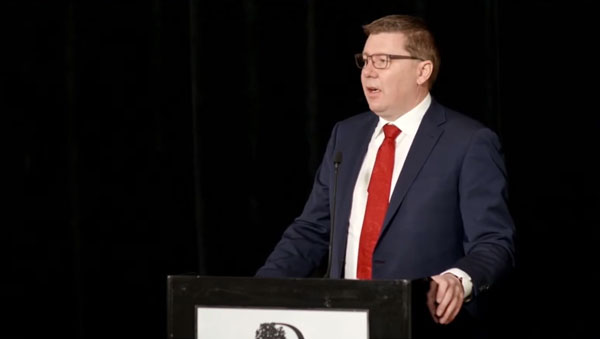
The annual bear pit session with cabinet closed the Saskatchewan Association of Rural Municipalities (SARM) virtual convention on Wednesday.
Questions ranged from the federal carbon tax Supreme Court challenge, to pipelines and mental health.
SARM President Ray Orb moderated the bear pit, which was done as a call-in format with the cabinet broadcasting from the basement of the Saskatchewan Legislature. Cabinet ministers Warren Kaeding, David Marit, Everett Hindley, Laura Ross, Fred Bradshaw, Paul Merriman, Don McMorris, Donna Harpauer, Don Morgan, Jeremy Harrison, Lori Carr, Jim Reiter, Christine Tell, Bronwyn Eyre, Gene Makowsky, Dustin Duncan, Gord Wyant and Premier Scott Moe all took part.
In the opening question, cabinet was asked about the status of lifting COVID-19 restrictions and the status of the Supreme Court challenges. Moe pointed to Tuesday’s announcement on COVID restrictions, and the vaccination booking system announced on Wednesday, as signs the government had a strong plan to reopen.
“We are going to receive more vaccines in the next three weeks than we have in the last three months. We have the most robust plan and we will make those available to Saskatchewan people that is our path out of this pandemic. We did start softening restrictions yesterday and we are going to continue in the days and weeks ahead as our hospitalization numbers continue to reduce,” Moe said.
Health Minister Paul Merriman said they’re continueing to try and find a balance so that the hospital system is not overwhelmed.
On the carbon tax case, Attorney General Gord Wyant said they expect a decision shortly.
“I know that is not really much in terms of when we are going to get it, but the Supreme Court has indicated to us that we should be prepared for that. We are optimistic about the decision … (and) are anxiously waiting for that decision to come,” Wyant said.
The final question came from councillor Brian Fornwald of the RM of Browning. Fornwald was concerned for people in distress who say phone counselling is insufficient and he asked when in-person services will return. He added that addiction services are underfunded.
More mental health commitments are set to arrive and are under discussion for the upcoming budget, Mental Health and Addictions Minister Everett Hindley explained.
Moe told Fornwald that he plans to focus more on outcomes as part of their mental health commitments.
“You question is valid. With all of that investment, and the increasing need we’re seeing in our communities, I’m not certain we’re getting the outcomes that we all expect, including us in government.,” he said.
“Ultimately, all too often we’re faced with the conversation around suicides in our family, our community, our province.”
Another questioner asked Wyant why the trespassing law passed last year was not proclaimed. According to Wyant, they’re still working on how best to communicate it.
“That work is proceeding and I understand that it is proceeding quite quickly now,” he said. “We need to make sure we have the right vehicle in place so we can be sure that people have access to the information that they need so they are not offending the legislation. The last thing that we would want to do is proclaim the legislation without having the proper tools in place.”
Questions for Minister of Energy and Resources Bronwyn Eyre ranged from such things as surface rights legislation that was tabled under former Premier Brad Wall and the progress of geothermal drilling projects. A question from Orb himself revolved around what is happening around pipelines including the recently-halted Keystone XL pipeline.
Moe said that both Eyre and himself have been in conversation with American governors and senators on energy committees at all levels. Moe pointed to a bill in the US Senate that failed but he remains optimistic the American government will see the benefits..
“I don’t write Keystone off by any stretch. There was a campaign commitment by the new President, President Biden, around Keystone XL. When you look at the impact that Keystone XL has on not only the economics and ultimately the jobs, right from the Gulf Coast up through the states that it operates in (and) right through to the prairie provinces that ultimately would be providing product to go into that pipeline, it most certainly is a positive piece of infrastructure,” Moe said.
“I’m convinced that at some time, not this year likely not next year but at some time that it likely will be moving forward,” he added.
Another question was on the possibility of a power failure like the one that recently occurred in Texas. According to Minister of Environment Warren Kaeding, the province is managing a balanced power infrastructure.
“I think what the Texas situation really shows is that we need to have a blend of supply and we need to have renewables certainly. We do have some pretty ambitious goals within SaskPower moving to 50 per cent renewables by 2030 but renewables has also been involved in the mix with hydro power which is still going to be a significant part of the offerings that we have,” Kaeding said.
Former federal minister and current Reeve Gerry Ritz of the RM of Mervin asked about interprovincial trade barriers and before the question was answered Moe thanked Ritz for his service.
“Most notably let me say thank you for your advocacy in ultimately bringing across the line the removal of impediments to growth in agriculture, the removal of things like the Canadian Wheat Board. Thank you very much for all of your service Gerry it is greatly appreciated buy the industry in the province,” Moe said.
Other questions were to be forwarded by SARM following the conclusion of the convention.

